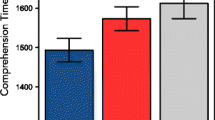Abstract
This study examined an observation in which children outscored adults on a series of test questions, which included unusual items such as, “Do you see with your ears?” We assumed that the adults were treating the questions metaphorically because the literally correct answer was so obvious, an assumption consistent with Grice's theory. In Study 1, we tested this assumption by manipulating pretest and test items so as to suggest, or not suggest, a metaphorical or factual response. In Study 2, we used a similar manipulation involving the order of questions of various sorts and we more directly tested the Gricean hypothesis by giving college students a reason to treat the question literally. The results replicated the previous finding in which college students' scores were lower than those of children, and the condition effects suggested that the college students' performance was due to their responding metaphorically.
Similar content being viewed by others
REFERENCES
Brainerd, C. J. (1973). Judgments and explanations as criteria for the presence of cognitive structure. Psychological Bulletin, 79, 172–179.
Brainerd, C. J. (1977). Response criteria in concept development research. Child Development, 48, 360–366.
Demorest, A., Silberstein, L., Gardner, H., & Winner, E. (1983). Telling it as it isn't: Children's understanding of figurative language. British Journal of Developmental Psychology, 1, 121–134.
Gentner, D. (1988). Metaphor as structure mapping: The relational shift. Child Development, 59, 47–59.
Grice, H. (1975). Logic and conversation. In P. Cole (Ed.), Syntax and semantics, Vol. 3. New York: Academic Press.
Siltanen, S. A. (1990). Effects of explicitness on children's metaphor comprehension. Metaphor & Symbolic Activity, 5, 1–20.
Vosniadou, S. (1987). Children and metaphors. Child Development, 58, 870–885.
Waggoner, J. E., & Palermo, D. S. (1989). Betty is a bouncing bubble: Children's comprehension of emotion-descriptive metaphors. Developmental Psychology, 25, 152–163.
Werner, H. (1937). Process and achievement. Harvard Educational Review, 7, 353–368.
Author information
Authors and Affiliations
Rights and permissions
About this article
Cite this article
Winer, G.A., Cottrell, J.E., Mott, T. et al. Are Children More Accurate than Adults? Spontaneous Use of Metaphor by Children and Adults. J Psycholinguist Res 30, 485–496 (2001). https://doi.org/10.1023/A:1010413513150
Issue Date:
DOI: https://doi.org/10.1023/A:1010413513150




